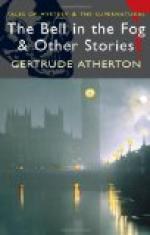V
A Monarch of a Small Survey
I
The willows haunted the lake more gloomily, trailed their old branches more dejectedly, than when Dr. Hiram Webster had, forty years before, bought the ranchos surrounding them from the Moreno grandees. Gone were the Morenos from all but the archives of California, but the willows and Dr. Hiram Webster were full of years and honors. The ranchos were ranchos no longer. A somnolent city covered their fertile acres, catching but a whiff at angels’ intervals of the metropolis of nerves and pulse and feverish corpuscles across the bay.
Lawns sloped to the lake. At the head of the lawns were large imposing mansions, the homes of the aristocracy of the city, all owned by Dr. Webster, and leased at high rental to a favored few. To dwell on Webster Lake was to hold proud and exclusive position in the community, well worth the attendant ills. To purchase of those charmed acres was as little possible as to induce the Government to part with a dwelling-site in Yosemite Valley.
Webster Hall was twenty years older than the tributary mansions. The trees about it were large and densely planted. When storms tossed the lake they whipped the roof viciously or held the wind in longer wails. There was an air of mystery about the great rambling sombre house; and yet no murder had been done there, no traveller had disappeared behind the sighing trees to be seen no more, no tale of horror claimed it as birthplace. The atmosphere was created by the footprints of time on a dwelling old in a new land. The lawns were unkempt, the bare windows stared at the trees like unlidded eyes. Children ran past it in the night. The unwelcomed of the spreading city maintained that if nothing ever had happened there something would; that the place spoke its manifest destiny to the least creative mind.
The rain poured down one Sunday morning, splashing heavily on the tin of the oft-mended roof, hurling itself noisily through the trees. The doctor sat in his revolving-chair before the desk in his study. His yellow face was puckered; even the wrinkles seemed to wrinkle as he whirled about every few moments and scowled through the trees at the flood racing down the lawn to the lake. His thin mouth was a trifle relaxed, his clothes hung loose upon him; but the eyes, black and sharp as a ferret’s, glittered undimmed.
He lifted a large bell that stood on the desk and rang it loudly. A maid-servant appeared.
“Go and look at the barometer,” he roared. “See if this damned rain shows any sign of letting up.”
The servant retired, reappeared, and announced that the barometer was uncompromising.
“Well, see that the table is set for twenty, nevertheless; do you hear? If they don’t come I’ll raise their rents. Send Miss Webster here.”




